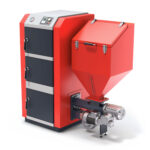[ad_1]

The Boiler Update Scheme (BUS) is a authorities initiative for householders. It aims to aid the property owner afford the upfront price tag of installing a warmth pump. The policy can offer up to £5,000 for air-source heat pumps, and £6,000 for floor-source heat pumps.
The Government’s Boiler Upgrade Plan has been a relative failure as much. A House of Lords Committee sent a scathing review of the scheme, so it is astonishing to see it extended until finally 2028. The whole benefit of the scheme is £450m, with the hope that all new heating system installations will be small carbon by 2035.
How does the Boiler Update Plan do the job?
The scheme introduced on the 1st of April and worked on a to start with-appear-very first-served basis for those who are eligible. The overarching initiative is the Warmth and Building Method which replaced the ineffective Environmentally friendly Home Grant. The foundation for the scheme is identical, however, whereby the federal government contributes mounted sums in direction of setting up small-carbon vitality measures. In this occasion, for air and ground source warmth pumps.
Funding and software
A basic floor source warmth pump can value between £2,000 to £15,000 as the funding is administered as a result of grants, the home-owner will will need to pay out the change. As the grants are possibly £5,000 or £6,000 relying on the warmth pump mounted, it is feasible that the homeowner will will need to fork out some additional cash for the installation.
The software approach depends on the independent regulator Ofgem. They will actively negotiate and agree on a quote for the installation and implement for the grant on your behalf. Redeeming of the voucher will be led by the installer, which will verify proof of the set up and system the completed paperwork. You will then have to have to confirm that the installer is acting on your behalf when Ofgem contacts you.
Eligibility for the Boiler Update Plan
The eligibility for the scheme is split into installer, house, and know-how eligibility. Installers will involve certification by the MCS. To make certain that we present the proper requirements, the subsequent text is taken right from Ofgem:
House eligibility
In buy to be qualified for a BUS-funded set up, a property need to:
- be in Eire and Wales
- comply with the insulation necessities of the scheme, or be exempt from these (when you implement, you will require to provide proof of this exemption)
- (retrofits only) have an existing fossil-gas or electrical heating method which is getting replaced by the BUS-funded set up
Homes simply cannot be:
- social housing
- new builds (other than the place they are ‘self builds’ that have been constructed generally applying the labour or methods of the initial operator and have never ever been owned by a business or organisation)
Suitable systems
The next systems are suitable for the BUS:
- air resource heat pumps (not like air-to-air warmth pumps)
- ground source warmth pumps
- ground supply warmth pumps as section of a shared ground loop
- biomass boilers
Other eligibility conditions
Installers have to ensure that the new warmth pump or biomass boiler complies with necessities of the BUS polices. These include things like that:
- the new warmth pump or biomass boiler will be commissioned on or after 1 April 2022
- the new warmth pump or biomass boiler meets the specifications approved and released by the Secretary of State (to help you check, you can use the Boiler Improve Plan product or service eligibility list, which is a subset of the MCS item eligibility record)
- the new heating program will be capable of meeting the total space and water heating needs of the house, and it is built to do so
- the new heating process will only offer heating to the home staying utilized for (and any ‘related properties‘ that are integrated on the EPC)
- the new warmth pump or biomass boiler will distribute heat using a liquid, for illustration through radiators or underfloor heating
- the new heating technique will have a most capacity of 45kWth (for shared ground loops, the mixed capacity of all heat pumps on the shared loop can’t exceed 45kWth)
- the new heat pump or biomass boiler will not have been employed prior to commissioning, besides in confined conditions, eg to dry out plasterwork in the course of construction or renovation (for shared floor loops, a new heat pump can connect to an present shared loop)
- the new heating process will not be a hybrid technique that combines a heat pump with fossil gas heating
- all heat-producing components of the unique heating technique will be replaced (in which relevant, you could keep circulation pumps, solar thermal collectors, wood-burning stoves, and supplementary electric powered heaters, including immersion heaters)
- the new heating program will substitute either a fossil fuel heating program or an electric powered heating technique
- the new heating procedure will not exchange a technique that now is made up of a heat pump or biomass boiler
- the residence owner has not been given another grant from general public money to address any of the obtain or set up fees
- the new heating system has not have been funded by the Power Enterprise Obligation (ECO)
- the residence owner at the set up deal with will have the new heating technique following it is put in
An added requirement for heat pumps only is that they:
- have a minimum amount seasonal coefficient of overall performance (SCOP) ranking of 2.8
In addition, biomass boilers:
- can only be set up in rural properties
- can only be installed in houses that are not, and have never ever been, linked to the gasoline grid
- can not be mounted in self-builds
- should have an emissions certificate to present they satisfy specified emissions expectations for the scheme
Cost of heat pumps and biomass boilers
The cost of air-supply heat pumps, floor-resource heat pumps, and biomass boilers can differ depending on various aspects, these kinds of as the dimension of the technique, the style and top quality of parts employed, the complexity of the set up, and the place of the house.
As a tough tutorial, in this article are some average expenditures based on marketplace estimates and data:
-
Air resource warmth pumps: The put in cost of an air source warmth pump program generally ranges from £6,000 to £12,000 for a tiny to medium-sized home. This expense can range relying on the size of the home, the high quality of the technique, and the problems of the set up.
-
Floor supply warmth pumps: The installed price tag of a floor resource warmth pump process is generally bigger than an air supply process, ordinarily ranging from £10,000 to £18,000 for a tiny to medium-sized property. On the other hand, ground-resource heat pumps can be a lot more productive than air-resource heat pumps, this means they can deliver greater savings on power bills above time.
-
Biomass boilers: The set up charge of a biomass boiler program can range widely relying on the dimensions and variety of system, the good quality of factors utilized, and the complexity of the set up. As a tough tutorial, the put in cost for a domestic biomass boiler can variety from £10,000 to £20,000 or far more.
- Air supply heat pump
- Ground supply heat pump
- Biomass boiler
[ad_2]




